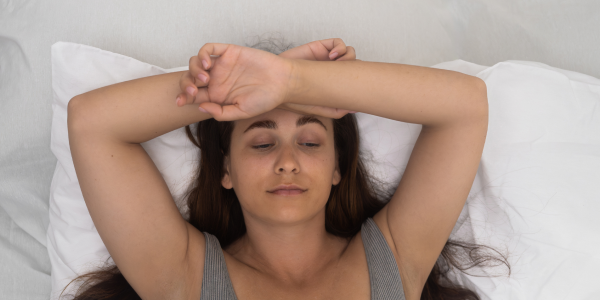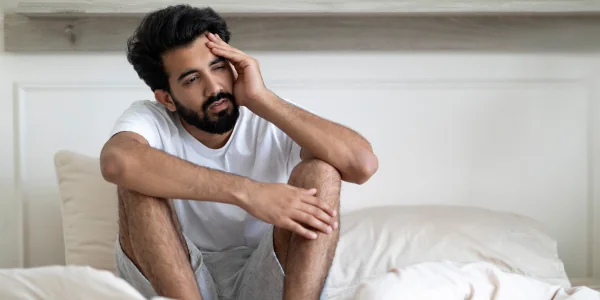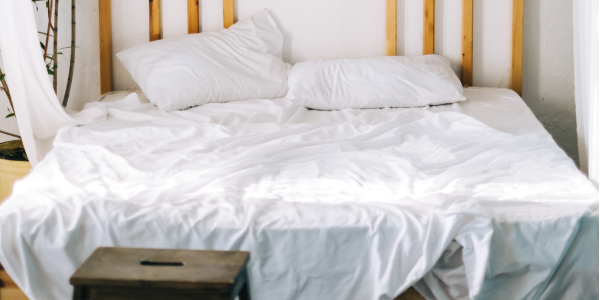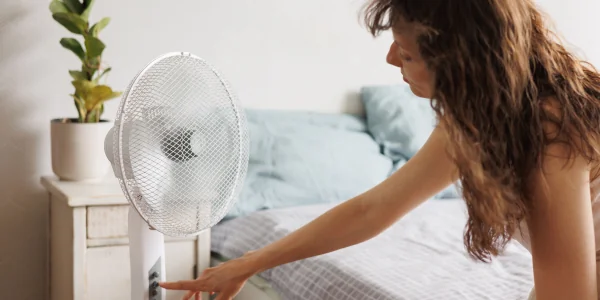
How to Sleep Better on Hot Summer Nights
Summer evenings in the UK can be surprisingly challenging for sleep, especially during heatwaves when temperatures soar well above the comfortable sleeping range.
Whether you’re dealing with a stuffy bedroom, restless nights, or finding yourself too hot to sleep, you’re not alone. Many people are searching for how to sleep better on hot summer nights — even in typically temperate Britain.
Quality sleep is essential for physical health, mental well-being, and daily performance. When the temperature rises, our bodies face additional challenges in achieving the restorative sleep we need.

This comprehensive guide explores practical strategies for how to sleep in summer, from environmental adjustments to bedtime routines, helping you navigate those sweltering nights without compromising your rest – and finally learn how to sleep better on hot summer nights.
Why Heat Disrupts Sleep and What Happens to the Body
Understanding why elevated temperatures interfere with sleep begins with recognising your body’s natural cooling process. Core body temperature naturally drops by 1-2 degrees Celsius in the evening, signalling to your brain that it’s time to sleep. This temperature reduction triggers the release of melatonin, the hormone responsible for sleepiness.
When ambient temperatures remain high, your body struggles to achieve this necessary cooling. The result is delayed sleep onset, frequent night wakings, and reduced time spent in deep, restorative sleep phases. Research indicates that the optimal bedroom temperature for sleep ranges between 16-19°C (60-67°F), yet summer temperatures often exceed this range significantly.
Heat also affects melatonin production directly. Elevated temperatures can suppress melatonin synthesis, disrupting your circadian rhythm and making it harder to feel naturally drowsy.
Additionally, when you’re uncomfortably warm, your body redirects energy towards cooling mechanisms like sweating and increased heart rate, keeping your nervous system in a more alert state rather than the relaxed state needed for sleep.
For those wondering how to survive on no sleep after particularly difficult nights, it’s worth noting that chronic sleep deprivation from heat-related sleep disorders and insomnia can compound over time, affecting immune function, cognitive performance, and emotional regulation.
How to Cool Your Bedroom Without Air Conditioning
Not every UK home has bedroom air con or bedroom air conditioning, but there are numerous effective strategies for creating a cooler sleep environment. Start with your bedding choices, swap heavy duvets for lightweight, breathable materials like cotton or bamboo. Consider using just a sheet or a summer-weight duvet with a lower tog rating.

Blackout curtains serve a dual purpose during summer months. Not only do they block light that might interfere with melatonin production, but they also prevent solar heat gain during the day. Keep curtains drawn during daylight hours to maintain cooler indoor temperatures.
Strategic fan placement can significantly improve air circulation. Position a fan near an open window to draw cool night air into the room, or create cross-ventilation by opening windows on opposite sides of your home. For immediate relief, try placing a bowl of ice in front of a fan to create a makeshift air conditioning effect.
Consider elevation changes for your sleeping position. Heat rises, so sleeping on a lower level of your home or even on the floor can provide temperature relief. Some people find that elevating their feet slightly helps with circulation and cooling.
Window treatments beyond curtains can help, too. Reflective film or external shutters can prevent heat buildup during the day. If possible, open windows fully once outdoor temperatures drop below indoor temperatures, typically in the early morning hours.

Bedtime Habits That Help You Sleep Better on Hot Summer Nights
Establishing consistent bedtime routines becomes even more crucial when figuring out how to sleep better on hot summer nights. Begin your cooling routine 2-3 hours before bed by taking a lukewarm shower or bath.
While it might seem counterintuitive, lukewarm water actually helps lower your core body temperature more effectively than cold water, which can cause your body to generate heat in response.
Timing your evening meals requires special attention during summer months. Heavy, protein-rich meals generate internal heat through digestion, so aim to finish eating at least 3 hours before bedtime. Opt for lighter dinners with plenty of fresh fruits and vegetables, which have higher water content and can help with hydration.
Digital device usage presents additional challenges during summer. Electronic devices generate heat and emit blue light that can suppress melatonin production. Create a technology-free bedroom environment and establish a digital curfew at least one hour before sleep.
Stay hydrated throughout the day, but be mindful of fluid intake close to bedtime to avoid frequent night wakings. Keep a glass of water beside your bed for sip-sized hydration if needed during the night.
Consider your sleepwear carefully. Loose-fitting, breathable fabrics like cotton or moisture-wicking materials can help regulate body temperature. Some people find that cooling their wrists and ankles with a damp cloth before bed helps trigger the body’s cooling response.
Natural Sleep Aids and Over-the-Counter Options
When environmental modifications aren’t sufficient, various sleep aids can provide additional support. Natural sleep aid options include herbal remedies like chamomile, valerian root, and passionflower, which have traditionally been used to promote relaxation and sleep onset.
Melatonin for sleep has gained considerable attention as a sleep aid option. Melatonin tablets can be particularly helpful when your natural melatonin production is disrupted by heat and irregular sleep patterns. Products like Circadin contain 2mg of prolonged-release melatonin, designed to help regulate your body clock when it’s been thrown off by environmental factors.
Over the counter sleep medicine options should be used judiciously and according to package directions. While these sleeping aids can provide temporary relief, they’re not intended as long-term solutions. Sleep aid tablets work differently for different individuals, and what helps one person may not be suitable for another.
Magnesium supplements represent another natural sleep aid approach, as this mineral plays a role in muscle relaxation and nervous system function. Some people find that magnesium glycinate taken 30-60 minutes before bed helps promote more restful sleep.
Always consult with a healthcare professional before starting any new supplement regimen, especially if you’re taking other medications or have underlying health conditions.
When to Seek Help for Ongoing Summer Sleep Issues
While occasional difficulty sleeping during summer is normal, persistent sleep problems may indicate underlying sleep disorders and insomnia that require professional attention. Consider seeking medical advice if you experience sleep difficulties for more than three weeks, even after implementing environmental and behavioural changes.
Warning signs that warrant professional consultation include chronic fatigue during the day, difficulty concentrating, mood changes, or reliance on sleep aids to function. Some individuals may have undiagnosed conditions like sleep apnoea, which can be exacerbated by heat and humidity.
Healthcare professionals can evaluate whether your sleep issues stem from environmental factors, medical conditions, or lifestyle habits. They may recommend sleep studies, adjust medications that might interfere with sleep, or suggest cognitive behavioural therapy for insomnia (CBT-I).
Your Path to Better Summer Sleep
Sleeping during summer doesn’t have to be a nightly battle. By understanding how heat affects your body’s natural sleep processes and implementing targeted strategies for cooling your environment, adjusting your bedtime habits, and using appropriate sleep aids when necessary, you can maintain quality rest even during the warmest months.
Remember that consistency is key, establish routines that work for your lifestyle and living situation, and be patient as your body adapts to new practices. Most people find that a combination of environmental modifications and behavioural changes provides the best results for anyone trying to learn how to sleep better on hot summer nights.
If you continue to struggle with sleep despite these interventions, don’t hesitate to seek professional guidance.
Quality sleep is not a luxury – it’s a necessity for optimal health and wellbeing, regardless of the season.






